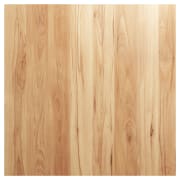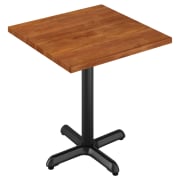RESTAURANT TABLES






- Country of Manufacture
-
- Material
-
















































Guide to Choosing the Best Restaurant Tables
Outfitting your restaurant with the right tables is more than just a functional choice—it's a design decision that influences your guests’ experience and your staff’s efficiency. Whether you're furnishing a trendy café, a high-end restaurant, or a casual bar, our wide selection of commercial-grade restaurant tables includes materials like solid wood, resin, laminate, veneer, granite, and more—all built for durability and style. We offer customizable options, fast shipping, and a robust warranty program to help meet your specific business needs.
When selecting restaurant table tops, consider how they complement your decor and support daily operations. Solid wood adds warmth and elegance to upscale environments, while laminate and resin offer affordable, low-maintenance options ideal for fast-paced or casual settings. For outdoor use, weather-resistant materials like aluminum or treated rattan are essential. And remember, table size and layout impact not only how many guests you can seat, but also how comfortable and efficient your space is for staff and patrons alike. Use our seating capacity guide to determine the optimal setup for your floorplan.
Quick Tips for Table Selection
- Always choose commercial-grade tables—residential furniture won't stand up to heavy use.
- Mix and match table tops with compatible bases to achieve a custom look and optimal stability.
- Ensure proper spacing between tables to enhance guest comfort and improve service flow.
- Plan for flexibility: drop-leaf or modular tables help accommodate fluctuating group sizes.
- Experiment with finishes and edge styles—from PVC and self-edge laminate to wood overlay—for a look that fits your brand.
Frequently Asked Questions
What table shapes are available for restaurants?
We offer rectangular, round, square, bar-height, and communal tables. Rectangular tables optimize seating in tight spaces, round tables encourage interaction, and bar tables work well in casual or high-traffic settings. Communal tables are great for group dining, while drop-leaf tables provide added flexibility.
Which materials are best for restaurant tables?
Solid wood is timeless and durable, ideal for upscale venues. Laminate and resin surfaces are cost-effective and easy to clean, making them perfect for high-turnover environments. Metal tables, like aluminum or stainless steel, are built for strength and often used outdoors.
How do I choose the right size and layout?
Start by assessing your floor plan and traffic flow. Leave enough space between tables for comfort and service efficiency. Rectangular tables suit narrow rooms, round tables foster conversation, and flexible configurations help accommodate varying group sizes.
What design features should I consider?
Pick table finishes and materials that align with your restaurant’s theme. Rustic settings benefit from reclaimed wood or distressed finishes, while contemporary spaces might favor sleek metal or clean laminate. Customizations like branded engraving or decorative inlays can reinforce your identity.
What makes commercial tables different from residential ones?
Commercial tables are built for high-traffic durability, with stronger construction, longer warranties, and materials designed to handle constant use. Investing in commercial-grade products helps reduce long-term costs and ensures consistent performance.
How does edge style affect performance and appearance?
Edge styles range from sleek self-edge to durable T-Mold and refined wood overlays. PVC edges offer top-tier resistance to moisture and wear, while inlays and overlays add visual detail and premium durability. Choose the style that best fits your aesthetic and durability needs.
Can I customize my restaurant tables?
Yes. You can select from various materials, shapes, sizes, and finishes. Custom edge profiles, logo engravings, and specialty colors are available to help your tables fit seamlessly into your space and enhance your brand presentation.